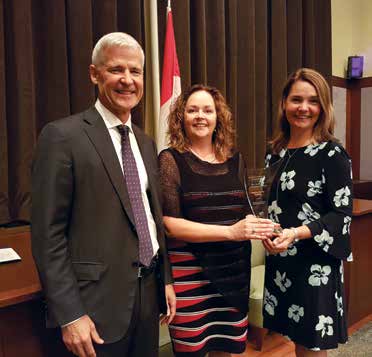Collaborating for Compliance
In the first year of her mandate, the Information Commissioner stressed the importance of collaborating with institutions. This collaboration, which has taken many forms, has a single and clear goal: to increase institutions’ compliance with the Access to Information Act, such that complainants receive the information to which they are entitled in a timely manner.
In meetings with deputy ministers and executive committees of the roughly 20 institutions with whom we have the most complaints, the Commissioner challenged senior leaders to ensure their institutions live up to their obligations under the Act and work with us to resolve complaints. She also sought to understand the challenges these institutions face and the best practices they have developed to provide better service to Canadians.
In each instance, the Commissioner encouraged executives to continue and to initiate specific actions to enhance compliance. To reinforce her expectation that institutions step up, she sent follow-up emails to the individuals she met to track concrete actions they have taken, and their results for requesters and complainants.
Complementing these meetings were two gatherings of access to information coordinators and the Commissioner. These sessions were an opportunity for her not only to introduce herself and her priorities to the community but also to hear from access professionals about their concerns. She shared best practices she had learned about from institutions and reported on her meetings with deputy ministers and other senior leaders.
We sent an email survey to all access to information coordinators in advance of the first meeting and conducted a live survey with attendees at the second. Through these, the Commissioner sought feedback about institutions’ challenges and how we could improve our interactions with institutions during investigations.
The coordinators validated new approaches we have undertaken, including developing clear and concise guidance on the procedures we follow during investigations and the Commissioner’s interpretation of provisions of the Act. It became clear during these meetings that the community is looking for more guidance on how we consider each section of the Act during investigations.
The coordinators welcomed our introduction of a portfolio approach for all types of complaints, based on our success organizing our work on a subset of files this way. Institutions will interact with a dedicated team of investigators on all complaints against them.
The Treasury Board of Canada Secretariat (TBS), as the administrator of the Act, is another key player in the federal access system. As such, we reached out to senior TBS officials by holding quarterly meetings with them to discuss common issues. In particular, the discussions focused on to how to ensure that access staff and employees across government receive regular and up-to-date training on meeting their obligations under the Act.

INVESTIGATIONS SHOWCASED
THE BENEFITS OF COLLABORATION
Collaboration between institutions and the Office of the Information Commissioner during investigations can help resolve complaints. For example, as a result of open communication and cooperation between investigators and institutions, complainants received more records from the Canadian Air Transport Security Authority, additional information related to Health Canada regulations on asbestos, and a report on the Canada Revenue Agency’s charities program.
Here are a few other notable examples from 2018–19 of how collaboration benefited complainants.
PROVIDING SUFFICIENT INFORMATION TO MEET REQUESTER’S NEEDS
After discussion with the investigator, Statistics Canada re-examined how it could most effectively respond to a request for specific data items in the database of T2 corporate tax returns. Access officials retrieved information that would help them explain to the complainant what information products it had related to T2 returns. Statistics Canada also accompanied the list with a record that described each product. As a result, the complainant was satisfied with the information they received and agreed to settle the complaint.

BEST PRACTICES FOR INCREASED DISCLOSURE
- Proactively release information Canadians regularly request. Example: Health Canada is looking at ways to disclose information about the testing of medications as soon as they are approved.
- Draft documents with access in mind, and identify parts of briefing notes that the public could see and parts that should be withheld (with a tick box in the template, for example).
- Include specific and clear disclosure and confidentiality clauses in third-party contracts so most of these documents can be disclosed.
- Provide access officials with access to the entire contents of official document repositories.
- Document decisions in official repositories rather than in long strings of emails.
RESOLVING COMPLAINTS ABOUT THIRD-PARTY INFORMATION
Collaboration with institutions can be particularly useful when investigating complaints involving third-party information. This is because our ability to negotiate further disclosure during investigations involving third parties is extremely limited. Institutions are not allowed to change their disclosure decisions until after we send formal recommendations on how to resolve matters. This protects the rights of third parties to challenge institutions’ decisions in court.
For example, after a great deal of discussion between the investigator, the complainant and Transport Canada, that institution released financial information the complainant had requested related to the maintenance and rehabilitation of the Churchill rail line by OmniTRAX.
In another investigation, Public Services and Procurement Canada’s access staff worked diligently with us and disclosed a substantial amount of information regarding the International Organization for Migration and the relocation of Syrian refugees. Access officials also gave us a clear justification for withholding the remaining information.
To further promote institutional compliance with the Act, we published new guidance in April 2019 on how we investigate complaints that involve the exemption for third-party information. We will also be publishing an infographic to explain our process to complainants.
CANADA POST INCREASING DISCLOSURE
TO
COMPLAINANTS
The Commissioner met with senior leaders at Canada Post in 2018 to find a way forward on a large number of complaints, many dating from before 2017. The crux of the matter was differing interpretations of section 18.1 of the Act. This provision allows Canada Post to withhold trade secrets, commercial, scientific and technical information that belongs to it and that it has consistently treated as confidential.
Following the meeting, Canada Post executives committed to increasing transparency and resolving the outstanding complaints. Subsequently, there has been a marked improvement in our interactions with the institution. In addition, Canada Post has been disclosing information of the type it had previously withheld.
Due almost exclusively to Canada Post’s increased collaboration with us, we resolved 20 complaints against that institution in 2018–19. This is a significant increase over the previous year, when we were able to complete only five investigations, and exceeds other recent totals (12 files completed in 2017–18 and 10 in 2015–16).
2018 INFORMATION COMMISSIONER AWARD


GOING ABOVE AND BEYOND
TO HELP A REQUESTER
A requester was interested in learning more about why an individual had been imprisoned in the 1930s and asked for records from Library and Archives Canada (LAC). In response to her access request, the institution had refused to disclose personal information about individuals who were not her family member, a decision we accepted. Ordinarily, that would have been the end of the matter for us; however, we asked the institution to take a second look for other relevant information, in the spirit of their duty to assist requesters. Access staff willingly did so but found no further records. Following our discussions with LAC, the institution suggested other avenues for research to the requester. She expressed her gratitude for this response.
In June 2018, the Commissioner presented two access to information coordinators with the inaugural Information Commissioner’s Award. Marie-Claude Juneau, Canada Revenue Agency (left photo), and Dan Proulx, Canada Border Services Agency (right photo), were recognized for their efforts to motivate and inspire their colleagues to respect the right of access, and for their leadership in collaborating with us on investigations. The recipients exemplified the four criteria the award is intended to honour: communication, innovation, leadership and service.
Date modified: 2019-06-19